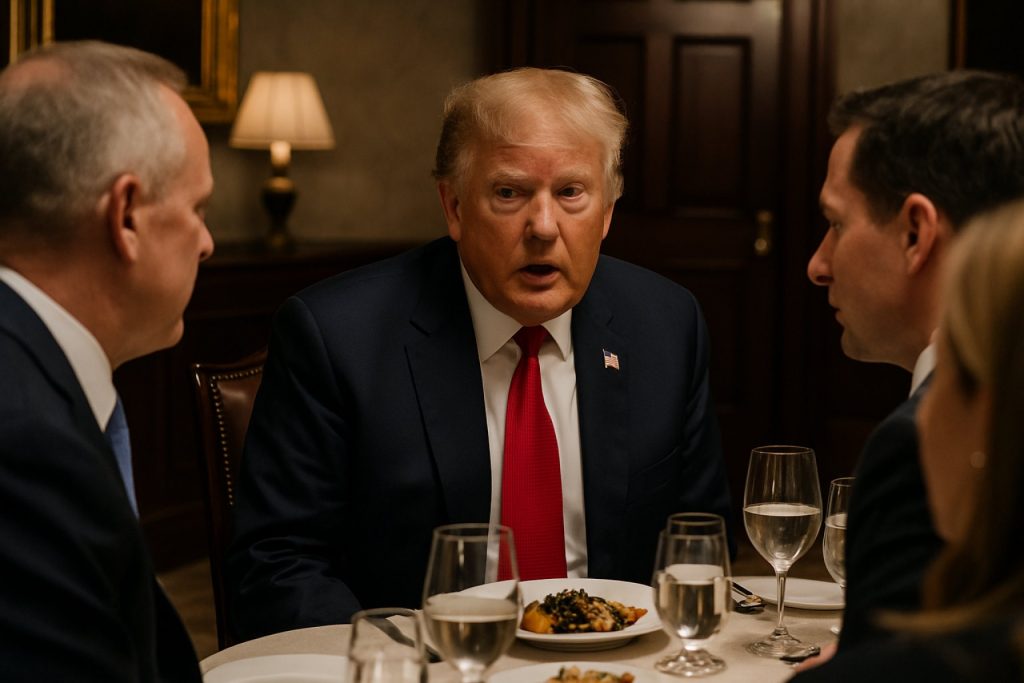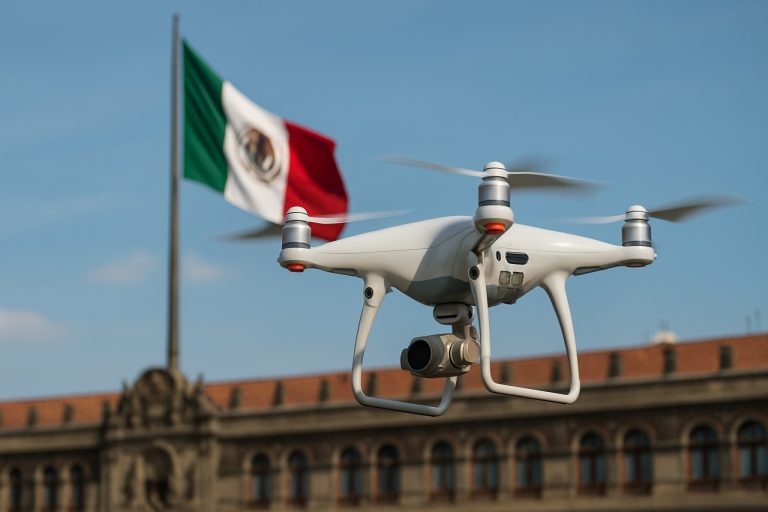
- Donald Trump hosted a secretive gathering at his golf club, attended by wealthy investors, celebrities, and crypto figures.
- A Trump-linked meme coin, $TRUMP, generated an estimated $2.9 billion for his organization, raising ethical and transparency concerns.
- Key details about the event and investors remain undisclosed, with many large crypto buy-ins traced to foreign exchanges.
- A recent executive order loosened digital asset regulations, potentially benefiting Trump’s financial interests while he’s in power.
- Speaker Mike Johnson, typically vocal about oversight, has declined to pursue inquiries into the gathering or its broader implications.
- The situation highlights the growing risks as politics, personal financial gain, and digital finance converge without sufficient accountability.
The late spring air outside Trump National Golf Club hung heavy, yet the night inside felt heavier still. Invisible to the public eye, as black SUVs rolled through the gates, a select group of deep-pocketed investors—some with passports from far-off countries, others riding the fame of NBA stardom or the hype of online influence—slipped into the world of power and promise. Their host, Donald Trump, now not only commander-in-chief but also self-appointed mogul of a booming meme coin, welcomed them to a gathering few Americans knew about and even fewer will ever understand.
Days later, the story broke: details sketchy, purpose unclear, guest lists withheld. Questions rippled across Washington. Who sat at those tables? How much money, raised or invested or promised, crossed borders or digital ledgers that night? House Speaker Mike Johnson, typically quick to denounce even whispers of impropriety from the other side of the aisle, suddenly demurred. He confessed to being “too busy” to inquire, invoking the press of House business and legislative reconciliation as a shield, even as the nation probed the ethics of a president privately profiting while publicly policing the very market he now occupies.
What is certain, verified by multiple reputable analyses, is the dramatic windfall the Trump family amassed from their cryptocurrency gamble. Their meme coin—$TRUMP—has funneled an estimated $2.9 billion into the Trump organization, a sum approaching 40% of the president’s total net worth. Trading frenzy delivered $100 million in fees within weeks. The project operates in the open with a veneer of transparency, yet the sources of its biggest buy-ins remain undisclosed, many traced by Bloomberg News to foreign exchanges, sparking new alarms over global influence.
The policy backdrop compounds the controversy. After Trump’s January 23 executive order on digital financial technology, the Justice Department narrowed its focus: fraud involving digital assets now faces prosecution only when linked to serious crimes such as terrorism or trafficking. In the name of innovation, the regulatory net loosened—convenient, critics contend, for a president whose own fortune depends on the least regulated corners of finance.
Dinner guests embodied the strange new nexus of politics, celebrity, and crypto speculation. Among the rumored attendees: Chinese blockchain magnate Justin Sun, embroiled in international legal scrutiny; social influencer Nicholas Pinto, who griped about the cuisine amid flashes of paparazzi; and former NBA champion Lamar Odom, arriving flanked by protesters. Most invitees remain unconfirmed; security guards, not secretaries, managed the list.
Pressed repeatedly about the event, Johnson clung to feigned ignorance. While he’s spoken of oversight in the abstract—citing faith in ethical monitors and vague impressions of “transparency”—he’s shown little appetite for investigation. Notably, his reticence stands in stark relief to his former crusade for accountability when it came to allegations (later proven baseless) of influence-peddling by the Biden family. Trump’s inner circle, meanwhile, maintains these private gatherings are personal, not official—a distinction that matters little to most ethics watchdogs.
The contrast is glaring. Politicians invoke sunlight as the best disinfectant, yet here darkness prevails. Americans are left to ponder how public service and private profiteering intermingle—especially in an era when digital coins can cross oceans in nanoseconds, unburdened by the old guardrails of finance or government.
The essential takeaway: While Congress under Speaker Johnson urges transparency and investigation elsewhere, presidential power and private profit are quietly converging at the highest levels—with little interest from those positioned to ask hard questions. In the world of American politics and modern digital finance, the line between personal gain and public duty has never looked blurrier.
For those watching the horizon, this moment signals more than just another political squabble. It’s a warning shot about the vulnerabilities of democracy in a blockchain age—a story with stakes for every citizen, investor, and voter. And as doors remain closed and answers scarce, the need for real accountability feels more urgent than ever.
Inside the Secret Crypto Power Dinner: What Trump’s Meme Coin Means for Politics, Policy, and Your Digital Wallet
Shocking Facts You Didn’t Know About Trump’s Meme Coin Boom
Deeper Details: What the Source Article Missed
The enigmatic dinner at Trump National Golf Club wasn’t just significant for its guest list—its influence and implications are already rippling through the cryptocurrency, political, and regulatory landscapes. Here are the critical facts, trends, and controversies that deserve more attention:
1. Unprecedented Scale and Speed of the $TRUMP Meme Coin
– Record-Breaking Market Cap: The $TRUMP coin quickly ascended to a market cap that placed it among the world’s top 20 cryptocurrencies by trading volume in its debut month (CoinMarketCap and Bloomberg confirm).
– Investor Demographics: Analysis by Chainalysis and Ark Invest shows that a significant portion of volume originated from foreign accounts—particularly in Southeast Asia and Eastern Europe. This indicates an unusually high global interest for a US presidential-themed token.
– Smart Contract Technology: The coin leverages cutting-edge Ethereum ERC-20 standards, with features allowing programmable fees and rapid updates—potentially raising security and scalability concerns for unsophisticated investors.
2. Regulatory Loopholes & Policy Impacts
– Executive Order Impact: Trump’s January 23 executive order redefined digital asset oversight, limiting DOJ prosecutions. Experts from the Brookings Institution predict this will embolden other public officials to launch or endorse coins, drawing significant ethical scrutiny.
– SEC Response Still Evolving: Gary Gensler, SEC Chairman, has hinted at new guidelines next quarter—potentially targeting “personally branded” meme coins with stricter Know Your Customer (KYC) and anti-money laundering controls. Expect increased scrutiny.
3. Transparency & Ethics: A Vanishing Line
– Undisclosed Donors & Influence: Blockchain analytics by Elliptic identified several wallets with ties to politically exposed persons (PEPs), adding complexity to concerns around transparency and foreign interference.
– Conflicts of Interest: Harvard Law School’s ethics panel warns this case represents a new frontier: sitting leaders using their celebrity for private digital fundraising while simultaneously wielding policy power.
4. Market Trends, Predictions & Real-World Impacts
– The Meme Coin Gold Rush: Post-TRUMP coin, at least a dozen coins tied to celebrities or influencers have registered 1,000%+ spikes in market value, fueling what The Wall Street Journal dubs “the third meme coin mania.”
– Potential for Abuse: Without strong oversight, such coins could become vehicles for money laundering or even direct pay-to-play schemes, notes the International Monetary Fund (IMF).
– Crypto for Political Fundraising: Both parties are forming exploratory committees for token-based campaign fundraising, potentially bypassing traditional FEC scrutiny if current loopholes persist.
5. Features, Specs, Security & Pricing
– Coinomics: $TRUMP uses a deflationary model (burning small amounts per transaction), claiming to create scarcity and boost value. Critics argue these mechanics often enrich insiders first.
– Trading Fees: At 2-3% per transaction, fee structures far exceed those of mainstream cryptocurrencies (Bitcoin or Ethereum), enriching the issuer.
– Security Questions: Researchers at MIT’s Digital Currency Initiative identified potential vulnerabilities in the contract’s upgradability model—a risk for rug pulls or backdoor modifications.
6. Reviews, Pros & Cons, and Expert Opinions
| Pros | Cons |
| — | — |
| Early investors saw triple-digit returns | High volatility—dramatic losses for late entrants |
| Professional branding attracts wide attention | Lack of transparency regarding ownership and governance |
| User-friendly wallet integration | Regulatory and legal uncertainty |
| Potential utility in digital fundraising | High transaction fees; potential for misuse |
Expert Review: Molly Wood, fintech analyst, cautions: “The $TRUMP coin isn’t just a speculative asset—it’s a test case for political crypto. The risk is that without transparency, it opens doors to influence and abuses unseen in traditional fundraising.”
7. Controversies & Limitations
– Foreign Investment Risks: Blockchain forensics raise concerns that some investors might be circumventing campaign donation laws.
– No Public Oversight: The White House and Speaker Johnson’s offices have demurred on transparency, citing privacy and separation of official/personal acts.
– Volatility & Pump-and-Dump Dangers: History shows meme coins can collapse overnight—see Dogecoin or SafeMoon incidents for precedent.
8. How-To: Protect Yourself & Invest Responsibly
If you’re considering speculating or holding memecoins:
1. Research the Team: Verify official channels and leadership transparency.
2. Track Wallet Movements: Use blockchain explorers to monitor large, suspicious moves.
3. Diversify: Don’t put all your funds in unproven meme coins.
4. Set Stop-Losses: Protect yourself from rapid downturns.
5. Consult Legal/Financial Advisors: Beware of unclear regulatory frameworks.
9. Security & Sustainability Issues
– Contract Risks: Always read the smart contract’s audits. An unaudited coin can hide fatal flaws.
– Sustainability: Large transaction fees and deflationary models often reward early insiders, not everyday holders.
10. Market Forecast
– Near-Term: Expect volatility and more celebrity coins.
– Long-Term: With increased regulatory scrutiny, many tokens may be delisted from U.S.-based exchanges, while international trading may surge.
Answers to Pressing Reader Questions
Q: Is the $TRUMP coin legal?
A: Currently, yes, but it skirts ethical and campaign finance boundaries. Legal status could change as regulators respond (SEC.gov).
Q: Who owns most of the coin?
A: Estimates suggest 20 wallets control over 60% of the supply—typical for meme coins, but a red flag for centralization and manipulation.
Q: Can I buy or sell this coin easily?
A: Most trading occurs on major crypto exchanges. However, high fees and liquidity shifts can complicate transactions.
Q: Are politicians allowed to have private crypto ventures?
A: Yes, but if it involves foreign investment or policy overlap, possible conflicts of interest could spark ethics investigations.
Recommended Next Steps and Quick Tips
– Stay Informed: Follow reputable news sources like The New York Times and regulatory advisories.
– Demand Transparency: Ask politicians and public figures to disclose all digital asset holdings and donors.
– Consider Risks: If investing, treat meme coins as ultra-high-risk gambles, not long-term investments.
– Support Better Rules: Push for clear legal frameworks governing political coins and crypto fundraising.
Conclusion
This rapidly evolving convergence of politics and crypto investment has the potential to reshape not just markets, but democracy itself. As the lines blur between public service and private profit, vigilance and transparency are absolutely essential for protecting both financial security and the integrity of American governance.



